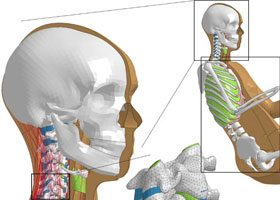Crash safety testing is one of the tools used to improve safety on roads. The EU is therefore funding a research project that started recently to develop virtual methods of crash testing. The long-term goal is to supplement the physical evaluation of crash protection in and from the cars by virtual testing with computer models of the human, based on both an average man and an average woman. The Swedish participants involved in the project include the Swedish National Road and Transport Research Institute (VTI), Chalmers, Folksam, Volvo Cars and DYNAmore.
The project called VIRTUAL, “Open Access Virtual Testing Protocols for Enhanced Road User Safety”, is a research project being funded through “Horizon 2020”, the EU’s framework programme for research and innovation. Horizon 2020 is the world’s largest investment in research and innovation and has a budget of around 80 billion euros.

A virtual model of the human, developed in the the Vinnova financed project VIVA. Illustration: VIVA
The VIRTUAL project will develop virtual testing methods and open source human body models, of pedestrians, cyclists, passengers in vehicles and standing occupants in public transport. The human body models are developed to be used in consumer tests, in which physical crash testing is supplemented with virtual tests in order to identify the best performing safety innovations.
After the project there will be virtual models of an average woman and an average man available, whose properties will be possible to vary. The models will have active muscle functions. This makes it possible to simulate what happens to the human body before and in a crash. It will also be possible to scale the model to different properties, sizes and ages.
“By combining traditional physical testing with virtual testing, there will be better possibilities in the future to evaluate systems in cars that protect both men and women, and to evaluate the protection in several different crash situations,” says Professor Astrid Linder, Research Director of Traffic Safety at VTI and coordinator of the VIRTUAL project.
VIRTUAL, which will last for four years and started on 1 June 2018, has a total budget of almost seven million euros. 15 partners in eight countries are involved in the project, five of them based in Sweden: VTI, Chalmers University of Technology, Folksam, Volvo Cars and DYNAmore.

Contact:
Astrid Linder
astrid.linder@vti.se
VTI, Sweden






Follow us: